It looks like you're using an Ad Blocker.
Please white-list or disable AboveTopSecret.com in your ad-blocking tool.
Thank you.
Some features of ATS will be disabled while you continue to use an ad-blocker.
share:
Kool thread you got going here. It's great!
I used to know a guy that collected the feathers from his peacocks they were worth a bundle. No wonder he had lots of good luck. Looking forward to more from you.
I used to know a guy that collected the feathers from his peacocks they were worth a bundle. No wonder he had lots of good luck. Looking forward to more from you.
a reply to: AngelicIRage
Thank you!
I've got more planned to add to this thread, will get around to it later. Tune back in tonight or tomorrow!
Thank you!
I've got more planned to add to this thread, will get around to it later. Tune back in tonight or tomorrow!
Sorry I didn't post part 3 yet. I was overwhelmed all day.
Hopefully tomorrow I can post it.
It'll be worth the wait...
Hopefully tomorrow I can post it.
It'll be worth the wait...
Ok so basically I've had pretty much nothing but straight revelation after revelation for the last 48 hours in relation to all of this. I'm back into
the flow of epiphany epilepsy after maybe a month of being overly focused on other things (job, legal matters, basic survival, etc).
The next part of this is gonna be huge (it'll be like 3,4,5,6 and 7 combined)...
And I'm not just gonna link some stuff, I gotta make it look good and express the essence of who I am and what I do while I link and teach and reach the next level of whatever the hell I Am.
Now that I know exactly what I wanna talk about I gotta focus on style and presentation, on organization and application.
At best I could only post a few pieces tonight...
If I don't just wait till tomorrow.
I'll get this up.
If you've followed this far... just wait a lil more... I'm gonna blow your mind hard Kore.
The next part of this is gonna be huge (it'll be like 3,4,5,6 and 7 combined)...
And I'm not just gonna link some stuff, I gotta make it look good and express the essence of who I am and what I do while I link and teach and reach the next level of whatever the hell I Am.
Now that I know exactly what I wanna talk about I gotta focus on style and presentation, on organization and application.
At best I could only post a few pieces tonight...
If I don't just wait till tomorrow.
I'll get this up.
If you've followed this far... just wait a lil more... I'm gonna blow your mind hard Kore.
Over the next few years I will post my 50 threads on esoterica (and and a few dozen threads on my older staples like political theory, medicine, and
science). Some of these threads are gonna be huge.
For instance, when I wrote my revelations on the Elixir of Life in January-February 2015 it was like 30 or 40 days straight of sizable additions that flowed into a cohesive singular piece. If I could post that content it would be probably 50 pages of me taking up all 20 post slots, if not more. Most of these threads are not like this one, a lot of them are stand alone and unique unto themselves. So don't think it'll all be like this. Some will be similar, others will be very different.
One of the most important and primary features of all of my 'esoteric arcana' themed threads is and will remain about expressions of Magic. I'll explain how it all works as we go.
If you look closely this thread here is full of Magic already.
Instead of trying to keep the Mojo flowin, I'll just let it keep me goin.
So I'll just bind my spells and unwind the parallels as I stay bound to the sound of

And Remember...
I'm barely Scratching the
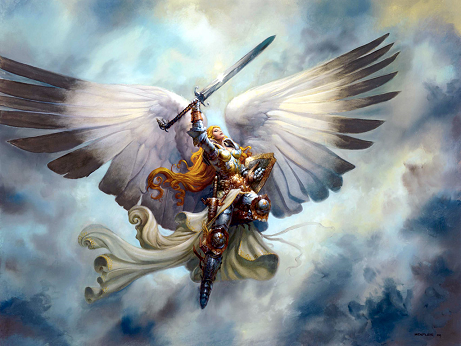
For instance, when I wrote my revelations on the Elixir of Life in January-February 2015 it was like 30 or 40 days straight of sizable additions that flowed into a cohesive singular piece. If I could post that content it would be probably 50 pages of me taking up all 20 post slots, if not more. Most of these threads are not like this one, a lot of them are stand alone and unique unto themselves. So don't think it'll all be like this. Some will be similar, others will be very different.
One of the most important and primary features of all of my 'esoteric arcana' themed threads is and will remain about expressions of Magic. I'll explain how it all works as we go.
If you look closely this thread here is full of Magic already.
Instead of trying to keep the Mojo flowin, I'll just let it keep me goin.
So I'll just bind my spells and unwind the parallels as I stay bound to the sound of

And Remember...
I'm barely Scratching the

This is all about Discovering

and helping you overcome your Fear of

as we examine the

Yes, I've been rather busy lately fighting in

(you know, because we're all the same at the end of the day?)
And I'm here to tell you that I am not

but this will be something a lot like the

Because I'll be here teaching you about all sorts of stuff like the hidden knowledge of the Djed Eye.
So in a lot of ways it'll be a

For example, it's no random coincidence that the Wiki on the Djed explains
It then goes on to explain some connecting concepts
So the Djed is the Spine, the Sacred Tree, and the Column of Chakras of which the Kundalini coils.
And more, such as...

I'm sure you recognize them all around you in the modern world...

So these can be made from ceramics or in the Spine's case, myelin sheathes and bone.
It's an insulator (the opposite of a conductor). It aids in focusing the path of the Electrical Current.
Now normally the Djed will be depicted with two arms holding up the Sun Disk, so it's no wonder that people subconsciously see this and think it's perhaps an ancient 'Lightbulb'

So as we explore the Path of Ptah, whom holds the Was (Power), Ankh (Eternal Life), and Djed (Pillar) we'll look around the world for clues to figure out what this is all about.
A few tidbits without delving too deeply into Ptah, his consort was Sekhmet (associated with Wadjet) and his name could be pronounced several ways, like "Pita" (the bread, which is where we get words like Pizza and Pie from - think of the sacred wheel), but I generally pronounce it as "Tah" as the P is silent.
However according to this wiki on Ptah it actually says that it might be P-Tah as in Peter, and that in Semetic it is:
"Pey Taw Heh. would indicate "Open" "bread" or "Free Bread"", although the term generally means "Opener".
So I'll make this simple, Ptah (the Creator God par excellence) Breathed the Universe into existence, so he Opened the "Breadth" of his Mouth/Eye and Breathed the "Bread of Life" with his "Word" which is meant to "B Read" and his Words (in the Bible) "B Red".
Remember? This is about Blood and Bread, and about Us the Children that were Bred by Ptah. We are the Breed of the Causemos (Cosmos).
And I didn't throw the word "Blood" in there by coincidence, as it refers to lineage or heritage as in "Brood".
Also definition 4 of "Breadth" is "overall unity of artistic effect".
Another word connection is from Djed, which was also "Jot" in Coptic.
So back to Matthew 7:3
"Why do you see the speck that is in your brother’s eye,
but don’t consider the beam that is in your own eye?"
It refers to our hypocritical habits of judging others while failing to judge ourselves.
And if you look up the word "Jot" it can mean to write something down, or it can mean "speck, iota, grain, crumb, shred, scrap, hint, trace".
Iota is the Greek letter I, and this reference is about the I (beam) in one's Eye. This is a hint, do you have an iota yet?
Beam? I Be Am?
So if the Djed is the 'backbone or spine' of God, than that means you - the "I Am" is the Pillar of the Temple (your body). You are the Beam of Light, or Ray of Re/Ra, that emanated from the Opening of the Mouth/Eye.

and helping you overcome your Fear of

as we examine the

Yes, I've been rather busy lately fighting in

(you know, because we're all the same at the end of the day?)
And I'm here to tell you that I am not

but this will be something a lot like the

Because I'll be here teaching you about all sorts of stuff like the hidden knowledge of the Djed Eye.
So in a lot of ways it'll be a

For example, it's no random coincidence that the Wiki on the Djed explains
It is a pillar-like symbol in hieroglyphics representing stability. It is associated with the creator god Ptah and Osiris, the Egyptian god of the afterlife, the underworld, and the dead. It is commonly understood to represent his spine.
The djed pillar was often used as amulets for the living and the dead. It was placed as an amulet near the spines of mummified bodies, which was supposed to ensure the resurrection of the dead, allowing the deceased to live eternally.
It then goes on to explain some connecting concepts
Additionally, the sacred tree and the Assyrian winged disk, which are generally depicted separately, are combined in certain designs, similar to the djed pillar which is sometimes surmounted with a solar disk.[13] Katherine Harper and Robert Brown also discuss a possible strong link between the djed column and the concept of kundalini in yoga.
So the Djed is the Spine, the Sacred Tree, and the Column of Chakras of which the Kundalini coils.
And more, such as...

I'm sure you recognize them all around you in the modern world...

So these can be made from ceramics or in the Spine's case, myelin sheathes and bone.
It's an insulator (the opposite of a conductor). It aids in focusing the path of the Electrical Current.
Now normally the Djed will be depicted with two arms holding up the Sun Disk, so it's no wonder that people subconsciously see this and think it's perhaps an ancient 'Lightbulb'

So as we explore the Path of Ptah, whom holds the Was (Power), Ankh (Eternal Life), and Djed (Pillar) we'll look around the world for clues to figure out what this is all about.
A few tidbits without delving too deeply into Ptah, his consort was Sekhmet (associated with Wadjet) and his name could be pronounced several ways, like "Pita" (the bread, which is where we get words like Pizza and Pie from - think of the sacred wheel), but I generally pronounce it as "Tah" as the P is silent.
However according to this wiki on Ptah it actually says that it might be P-Tah as in Peter, and that in Semetic it is:
"Pey Taw Heh. would indicate "Open" "bread" or "Free Bread"", although the term generally means "Opener".
So I'll make this simple, Ptah (the Creator God par excellence) Breathed the Universe into existence, so he Opened the "Breadth" of his Mouth/Eye and Breathed the "Bread of Life" with his "Word" which is meant to "B Read" and his Words (in the Bible) "B Red".
Remember? This is about Blood and Bread, and about Us the Children that were Bred by Ptah. We are the Breed of the Causemos (Cosmos).
And I didn't throw the word "Blood" in there by coincidence, as it refers to lineage or heritage as in "Brood".
Also definition 4 of "Breadth" is "overall unity of artistic effect".
Another word connection is from Djed, which was also "Jot" in Coptic.
So back to Matthew 7:3
"Why do you see the speck that is in your brother’s eye,
but don’t consider the beam that is in your own eye?"
It refers to our hypocritical habits of judging others while failing to judge ourselves.
And if you look up the word "Jot" it can mean to write something down, or it can mean "speck, iota, grain, crumb, shred, scrap, hint, trace".
Iota is the Greek letter I, and this reference is about the I (beam) in one's Eye. This is a hint, do you have an iota yet?
Beam? I Be Am?
So if the Djed is the 'backbone or spine' of God, than that means you - the "I Am" is the Pillar of the Temple (your body). You are the Beam of Light, or Ray of Re/Ra, that emanated from the Opening of the Mouth/Eye.
edit on 6/27/2017 by muzzleflash because: (no reason given)
Oh yeah, and P-Taw (Ptah) is probably a lot like a Peacock.
I ain't making this up...
From Definitions, citing Webster's.
Remember the part about Melek Taus earlier, the Peacock King/Angel??
Ok now I gotta figure out the next post...
I ain't making this up...
Peacock(noun) in common usage, the species in general or collectively; a peafowl Origin: [OE. pecok. Pea- in this word is from AS. pe, pwa, peacock, fr. L. pavo, prob. of Oriental origin; cf. Gr. taw`s, taw^s, Per. tus, twus, Ar. tws. See Cock the bird.]
From Definitions, citing Webster's.
Remember the part about Melek Taus earlier, the Peacock King/Angel??
Ok now I gotta figure out the next post...
edit on 6/27/2017 by muzzleflash because: (no reason given)
One last bit on Ptah, they have a wide assortment of jewelry in their Peacock Collection:

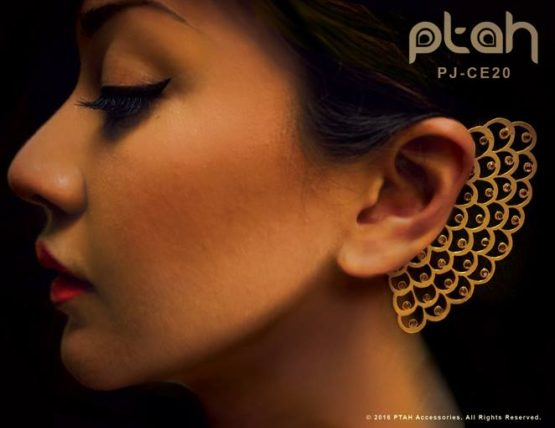
Note the Logo of Ptah Accessories, the P and A are both Eyes.
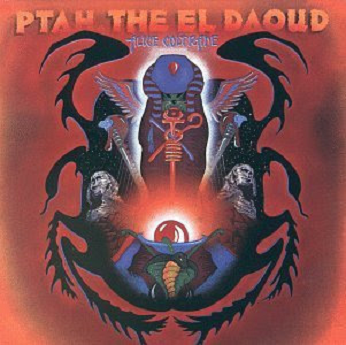
That's an album cover by Alice Coltrane.
also listed are Ramakrishna, Blue Nile, and Mantra.
The symbolism of that cover also conveys the hidden Caduceus, and the red orb at the bottom is the Root Chakra which represents the Base (Desires, Passions, Pride, physical Power). That's why the Sith in Star Wars (evil Jedi) use Red most likely, because it's the Lowest color on the Tree / Pillar.
That doesn't mean it's bad though, it represents being Grounded and conveys Stability. When negative aspects manifest they describe it as "the Charkra being blocked", causing depression, anxiety , fear, anger and frustration. So "getting to the Root of these problems" and "Clearing things up" is really important.
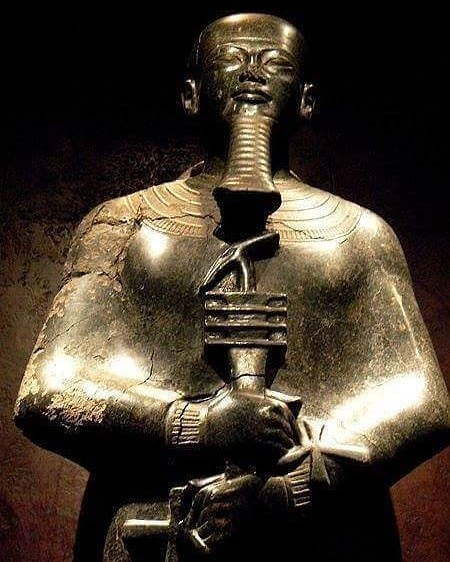
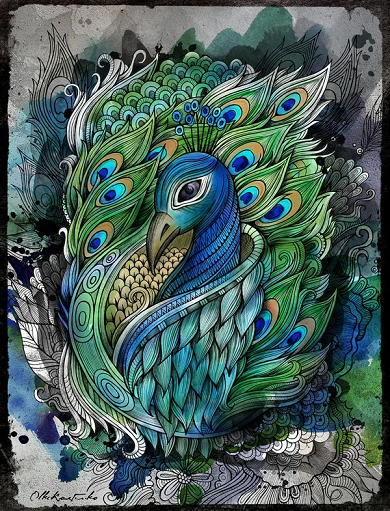


Note the Logo of Ptah Accessories, the P and A are both Eyes.

That's an album cover by Alice Coltrane.
The title track is named for the Egyptian god Ptah, "the El Daoud" meaning "the beloved". "Turiya", according to the liner notes, "was defined by Alice as 'a state of consciousness — the high state of Nirvana, the goal of human life"
also listed are Ramakrishna, Blue Nile, and Mantra.
The symbolism of that cover also conveys the hidden Caduceus, and the red orb at the bottom is the Root Chakra which represents the Base (Desires, Passions, Pride, physical Power). That's why the Sith in Star Wars (evil Jedi) use Red most likely, because it's the Lowest color on the Tree / Pillar.
That doesn't mean it's bad though, it represents being Grounded and conveys Stability. When negative aspects manifest they describe it as "the Charkra being blocked", causing depression, anxiety , fear, anger and frustration. So "getting to the Root of these problems" and "Clearing things up" is really important.


So this is about

that is, the

or maybe you'd like to call it the
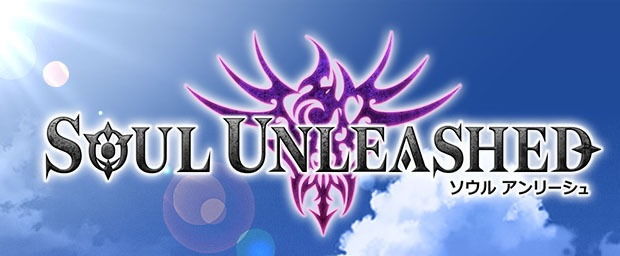
Note the symbolism.
To put it another way, we can call this

as we seek to attain an
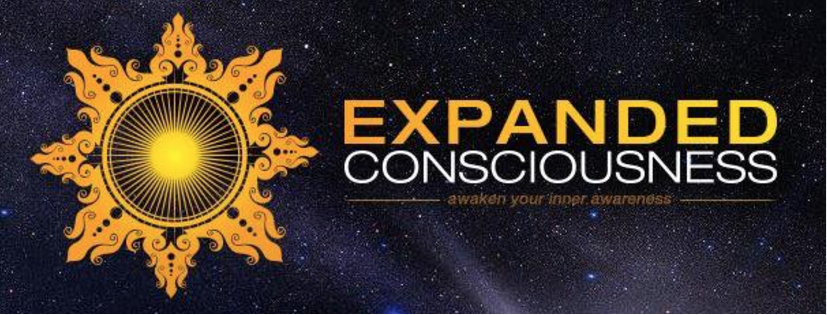
Which is really about Freedom and

So just say it out loud to yourself -


that is, the

or maybe you'd like to call it the

Note the symbolism.
To put it another way, we can call this

as we seek to attain an

Which is really about Freedom and

So just say it out loud to yourself -

This pic is of a low resolution, but I couldn't find a higher res version. It's does a decent job of conveying some aspects to all of this.
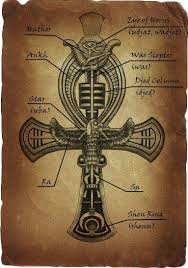
So you have the Was, Djed, and Ankh, combined with the Bird / Phoenix, upwards coiling to the Eye and Crown. It's a Cross with the Vesica Piscis, a Key and the Chi / Qi.
So this symbolism is a Key that allows you to Cross through the Opening to the other side (from Death to a New Life), and it also represents the manifestation of that Key which is Qi.
The Key Chi Qi is:
What's interesting is that Chi is also a Dragon Spirit in Chinese, and it paired with the words for "Handle, Knob", "Coiling", "Pattern", "Mouth", and "Steps" very frequently.
As it can be called "Dragon", this word in Chinese refers to "Spirit, Ghost, Demon" and is even compared to "Yin Yang Rainbow". Here's a link to the YinYang Rainbow Cosmology wiki and one to Rainbow Serpents in general.
This relates to a wide variety of "Creation Myths" around the world, to the Science of the Light Spectrum and how all matter is formed (See my thread You Are Light Being Alive for a very basic explanation of the modern physics and traditional understandings of how all material is composed of Light condensing.
In terms of YOU though personally, YOU are also a Creator of Your Own Destiny because You Control You.
You can Express Light from within the core of your being - your Heart.
So by merely deciding to choose Good and to Lift yourself upwards with Positive thoughts and ideas - you will Express Light outwards and Create.
This is the essence of the Force Unleashed, of Unchaining your Soul and letting it Spill outwards thus changing the actual physical world around you in all sorts of astonishing ways while drastically changing your own life for the better.
That's the Qi to the Gates, the Key of


So you have the Was, Djed, and Ankh, combined with the Bird / Phoenix, upwards coiling to the Eye and Crown. It's a Cross with the Vesica Piscis, a Key and the Chi / Qi.
So this symbolism is a Key that allows you to Cross through the Opening to the other side (from Death to a New Life), and it also represents the manifestation of that Key which is Qi.
The Key Chi Qi is:
Qi literally translates as "breath", "air", or "gas", and figuratively as "material energy", "life force", or "energy flow".
What's interesting is that Chi is also a Dragon Spirit in Chinese, and it paired with the words for "Handle, Knob", "Coiling", "Pattern", "Mouth", and "Steps" very frequently.
As it can be called "Dragon", this word in Chinese refers to "Spirit, Ghost, Demon" and is even compared to "Yin Yang Rainbow". Here's a link to the YinYang Rainbow Cosmology wiki and one to Rainbow Serpents in general.
This relates to a wide variety of "Creation Myths" around the world, to the Science of the Light Spectrum and how all matter is formed (See my thread You Are Light Being Alive for a very basic explanation of the modern physics and traditional understandings of how all material is composed of Light condensing.
In terms of YOU though personally, YOU are also a Creator of Your Own Destiny because You Control You.
You can Express Light from within the core of your being - your Heart.
So by merely deciding to choose Good and to Lift yourself upwards with Positive thoughts and ideas - you will Express Light outwards and Create.
This is the essence of the Force Unleashed, of Unchaining your Soul and letting it Spill outwards thus changing the actual physical world around you in all sorts of astonishing ways while drastically changing your own life for the better.
That's the Qi to the Gates, the Key of

Ok at the beginning of my "Jesus Unicorn" thread that I wrote around 4 years ago, I revealed that the symbol Chi in Japanese kana is ち the symbol of
Saturn.
But keep in mind it's also a concept in Odinani, the religion of the Igbo peoples of Nigeria.
Now pay close attention here...
It then goes on to compare the Odinani Chi concept to Guardian Angels in the West, the Daemon in Greek, and the Genius (Genii) in the Roman era.
So Daemon or Genius is "Spirit, Soul, Ghost". It is "Energy".
It can also represent totems, Spirit Guides, the Holy Spirit, or what have you. In the negative sense it's like the Devil, but in the positive sense it's like a Heavenly Angel. Yet as the word is somewhat vague it can also be your or my Spirit - or even the "Spirit of" or essence of a place or object. That is because everything is made of Energy and because Energy = Consciousness.
So YES - I, you, or anyone else discovers Truth via our Genius.
And so then we have the concept of
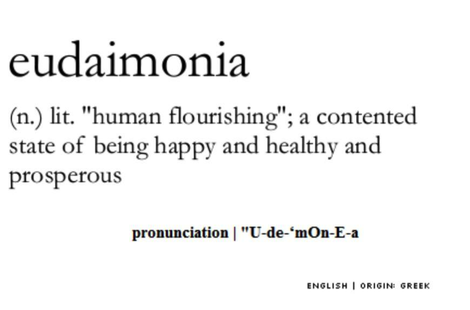
Huge wiki to look over here, Eudaimonia
Which is basically about the Chi and Voice of Choice

But keep in mind it's also a concept in Odinani, the religion of the Igbo peoples of Nigeria.
Chi is the personal spirit of a person ḿmúọ́, in Igbo culture it is this spirit which determines destiny. Hence the saying, onye kwe, Chi ya ekwe ("If a person agrees to a thing, his spirit agrees also"). Culturally, people are seen as the creators or makers of their own destiny.
Now pay close attention here...
The breath of life is in the heart, óbì.[18][19][20][21] Chi refers to the light and the day in contrast to the dark. The universal chi indirectly in charge of everything is Chukwu who is the supreme being that is beyond the limits of time and space. Chukwu's name is a compound of the words chí + úkwú ('great in size, supreme').[14] Chi is believed to be a spiritual connection between an individual and the high god and it dictates the trajectory of a person's spiritual journey on earth. Each chi is personal and is in communion with and inseparable from the universal chi of all things.
It then goes on to compare the Odinani Chi concept to Guardian Angels in the West, the Daemon in Greek, and the Genius (Genii) in the Roman era.
So Daemon or Genius is "Spirit, Soul, Ghost". It is "Energy".
It can also represent totems, Spirit Guides, the Holy Spirit, or what have you. In the negative sense it's like the Devil, but in the positive sense it's like a Heavenly Angel. Yet as the word is somewhat vague it can also be your or my Spirit - or even the "Spirit of" or essence of a place or object. That is because everything is made of Energy and because Energy = Consciousness.
Plato, in Cratylus[12] speculates that the word daimōn (δαίμων "deity") is synonymous to daēmōn (δαήμων "knowing or wise")
So YES - I, you, or anyone else discovers Truth via our Genius.
The Hellenistic Greeks divided daemons into good and evil categories: agathodaímōn (ἀγαθοδαίμων "noble spirit"), from agathós (ἀγαθός "good, brave, noble, moral, lucky, useful"), and kakodaímōn (κακοδαίμων "malevolent spirit"), from kakós (κακός "bad, evil"). They resemble the jinn (or genie) of Arab folklore, and in their humble efforts to help mediate the good and ill fortunes of human life, they resemble the Christian guardian angel and adversarial demon, respectively.
And so then we have the concept of

Huge wiki to look over here, Eudaimonia
Which is basically about the Chi and Voice of Choice

I'm going to try to make this as easy as

and help you gain that Tele Vision with your 3rd

so you can see the colors of the

as we go on a Journey of

examining a Trio of Angels

that'll have you standing up shouting

Hopefully it'll be explosive like

so it'll last you a

Now, did you ever notice that TIME Warner's logo is the Eye and Ear?

Really it's the Vesica Piscis and the Golden Ratio Phi φ from which emanates the Flower of Life and all of these other cool symbols that are being discussed herein.
And the companies name is "TIME" because we're talking about the Wheel...
The GPU is probably from

Now "Invidia" is where we get the words Invidious and Envy, which was used along with "Giving the Evil Eye", but it's original root meanings were basically "Look Upon".
Etymology Invidia
Vidia comes from the PIE root "Weid" (which is Weird) and if you'll look at this Etymological list of terms that came from this root, you'll probably start noticing some fascinating connections. Words like "Wise, Provide, Idea, Evident, Guide" come from this.
So let's Nvidia at the sorceress herself, Circe Invidiosa

That's Circe, the daughter of Hecate (the three faced Goddess of Magic and Witchcraft). Circe means Circle.
In that painting by John William Waterhouse she's wearing a gown of Peacock Feathers while she pours out poison into the waters Scylla uses to bathe in order to turn her into a monster. There are a lot of stories about her, and are interesting reads in mythology if you're interested. She's a Temptress that turns men into mindless beasts. Keep in mind not every story is exactly like that, but most are.
Isn't it a little strange, or Weird, that she's depicted wearing Peacock feathers and her sacred flower is the Poppy? This is all a circle or cycle of information we're going through, so you shouldn't be too surprised.
But I won't blame you if you start thinking this is looking like a "3 Ring Circus" or a Carnival.
And by that I'm probably referring to the Ships of... Carnival Cruise Line
This is their famous logo

and this is Carnvial Corporation's Flag
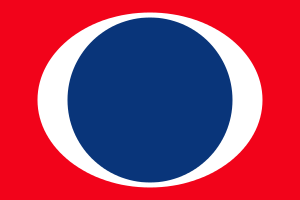
It's not a random coincidence that we have the Eye (Circle) and the Wings featured here.
Look at the names of their Ships:
Magic
Dream
Splendor
Miracle
Spirit
Elation
Imagination
Inspiration
Fascination
Sensation
Ecstasy
Fantasy
(among others relating to Victory, Triumph, etc).
So when you pass through the Eye it's like walking through the Triumphal Arch into the Seas.
These are some paintings of Roman Triumphal processions, note the symbolism employed - Wheel, Angels, Wreaths, coiling around pillars, etc.

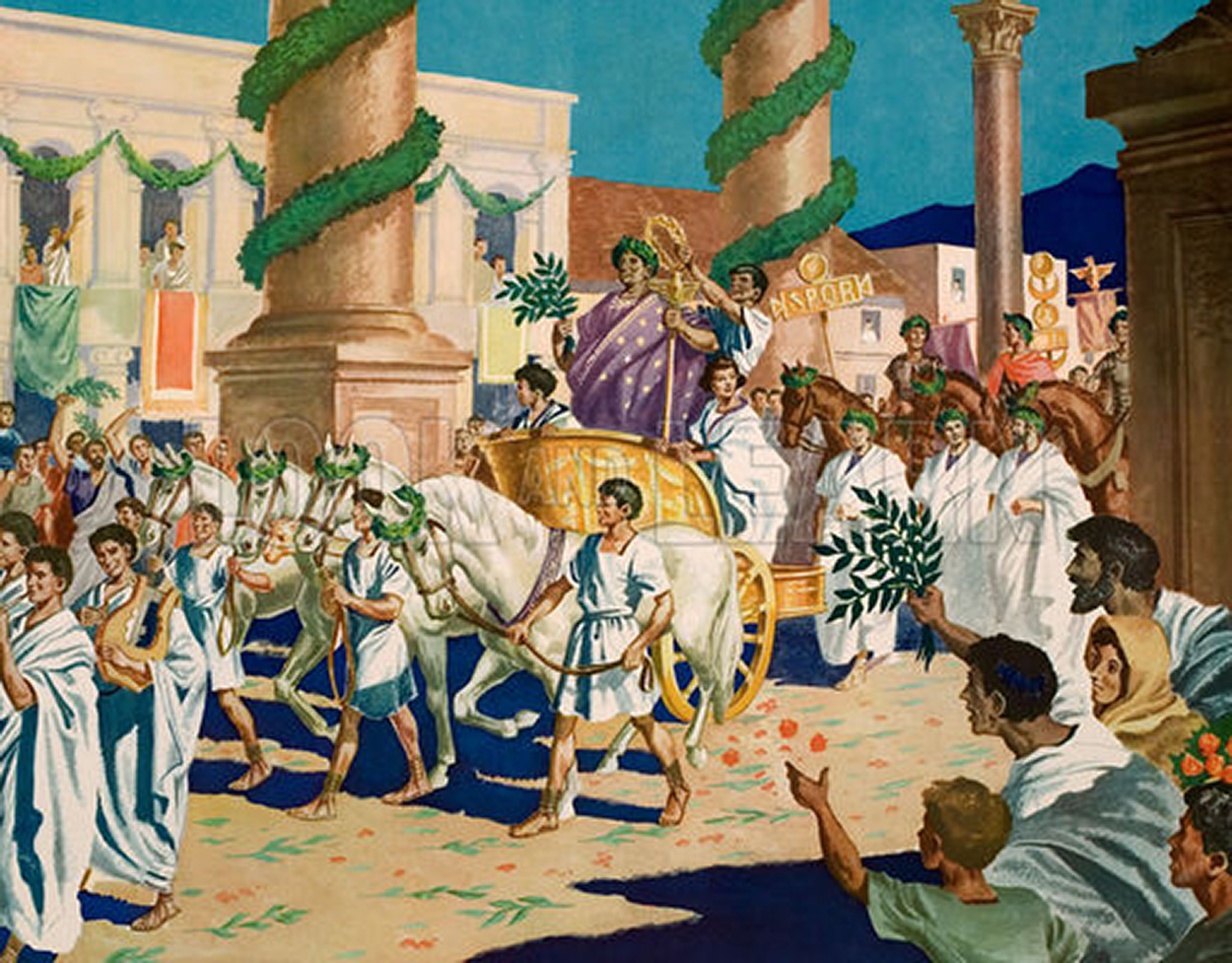
It would make sense that Triumph Motorcycles would utilize wreaths, triangles, and flags to look like wings in their logos. Ariel (which is the angel of the aerial) Motorcycles uses the Caduceus, wings, serpents and wheel - while Harley Davidson uses the wings-phoenix, and so has Kawasaki, etc. Just go look through all of these company logos for bikes or cars and look at how many of them are very similar in theme.
Oh yeah and the word itself "Carnival" only recently meant a Circus or Fair, it actually comes from the literal translation "Raise Flesh" and from Etymonline: "Folk etymology is from Medieval Latin carne vale " 'flesh, farewell!' ""
So let's Seize the Day and go on a Cruise into the High Seas to See what we can find...

and help you gain that Tele Vision with your 3rd

so you can see the colors of the

as we go on a Journey of

examining a Trio of Angels

that'll have you standing up shouting

Hopefully it'll be explosive like

so it'll last you a

Now, did you ever notice that TIME Warner's logo is the Eye and Ear?

Really it's the Vesica Piscis and the Golden Ratio Phi φ from which emanates the Flower of Life and all of these other cool symbols that are being discussed herein.
And the companies name is "TIME" because we're talking about the Wheel...
The GPU is probably from

Now "Invidia" is where we get the words Invidious and Envy, which was used along with "Giving the Evil Eye", but it's original root meanings were basically "Look Upon".
Etymology Invidia
Vidia comes from the PIE root "Weid" (which is Weird) and if you'll look at this Etymological list of terms that came from this root, you'll probably start noticing some fascinating connections. Words like "Wise, Provide, Idea, Evident, Guide" come from this.
It is the hypothetical source of Sanskrit veda "I know;"
So let's Nvidia at the sorceress herself, Circe Invidiosa

That's Circe, the daughter of Hecate (the three faced Goddess of Magic and Witchcraft). Circe means Circle.
In that painting by John William Waterhouse she's wearing a gown of Peacock Feathers while she pours out poison into the waters Scylla uses to bathe in order to turn her into a monster. There are a lot of stories about her, and are interesting reads in mythology if you're interested. She's a Temptress that turns men into mindless beasts. Keep in mind not every story is exactly like that, but most are.
Isn't it a little strange, or Weird, that she's depicted wearing Peacock feathers and her sacred flower is the Poppy? This is all a circle or cycle of information we're going through, so you shouldn't be too surprised.
But I won't blame you if you start thinking this is looking like a "3 Ring Circus" or a Carnival.
And by that I'm probably referring to the Ships of... Carnival Cruise Line
This is their famous logo

and this is Carnvial Corporation's Flag

It's not a random coincidence that we have the Eye (Circle) and the Wings featured here.
Look at the names of their Ships:
Magic
Dream
Splendor
Miracle
Spirit
Elation
Imagination
Inspiration
Fascination
Sensation
Ecstasy
Fantasy
(among others relating to Victory, Triumph, etc).
So when you pass through the Eye it's like walking through the Triumphal Arch into the Seas.
These are some paintings of Roman Triumphal processions, note the symbolism employed - Wheel, Angels, Wreaths, coiling around pillars, etc.


It would make sense that Triumph Motorcycles would utilize wreaths, triangles, and flags to look like wings in their logos. Ariel (which is the angel of the aerial) Motorcycles uses the Caduceus, wings, serpents and wheel - while Harley Davidson uses the wings-phoenix, and so has Kawasaki, etc. Just go look through all of these company logos for bikes or cars and look at how many of them are very similar in theme.
Oh yeah and the word itself "Carnival" only recently meant a Circus or Fair, it actually comes from the literal translation "Raise Flesh" and from Etymonline: "Folk etymology is from Medieval Latin carne vale " 'flesh, farewell!' ""
So let's Seize the Day and go on a Cruise into the High Seas to See what we can find...
So let's get to the Heart of the matter and talk about the one with all the Cards, Cardea of the
Cardiac.
She's the Carnal Incarnation of the Carnival and Carnations.
So if you can't wear a Poppy for Remembrance than I think this will suffice...
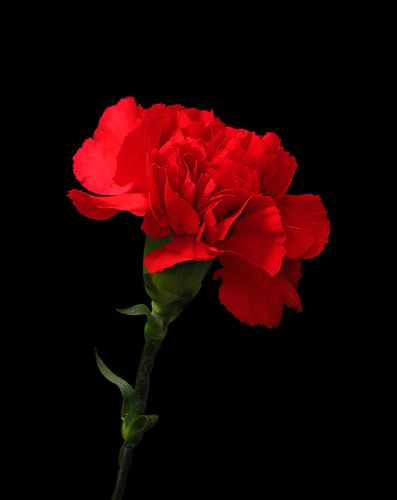
But don't become a Carnalite of Hedony and get obsessed with money and Carnelian (a red form of the gem chalcedony).
Oh and strangely enough, Cairns are a heap of stones, in Gaelic it's Carn. And I find it very funny that it means "highest part of the body, tip, horn, or peak" because I connected Carnal with Hedonism. Anyways...
Anyways, Cardea - Carna has been associated with all sorts of things from Earth Goddess to Luna to digestion and not much is known about how the allegory operated in ancient times.
What is known is that she's directly linked to Doorways and Hinges (funny because we have sites like Stone Henge and cairns all in the same geographic area and I just finished discussing Archways).
It's associated with Fortune through several ways, such as the fact Carda-Carna is grouped with Forculus and Limentinus,
Her feast day was the Bean-Kalends, a huge holiday. Everyone ate beans and they even thought beans were magical like many children's stories relate to this very day.
She became associated with Doorways because there were stories of Janus raping her then feeling guilty and so giving her the Hinge in payment. She was often confused with Diana (hence the moon connections).
But of course I'll tell you they are all the same one, and as I continue progressing in this exposition, that'll probably become very clear.
Ok so Carna-Carda, Janus, Forculus and Lima-Limentinus, etc etc were equated with Boundaries or Threshholds or Borders. Like Terminus.
Soon I'll show why all of this is actually Fortuna, but firm read over some of this wiki Herma
Ok so this is like an origin of our modern Gargoyles as well, in a few ways.
Another interesting link Caryatid which explains the origins of the Pillar Maidens at the temple of Artemis in Karyai.
But how does Carna and Hermes relate? Well it's his Mom.
Maia
Maia was also equated with Uni which was basically a unification of the triad of Juventas the Rejuvenator, Juno the Mother, and Minerva. So in a strange way Uni is Hecate - the three faced one. And this would imply that Carna was also incredibly similar if not the same.
Uni also is shown as granting eternal life when you ascend through the doorway to the next realm...
She's the Carnal Incarnation of the Carnival and Carnations.
So if you can't wear a Poppy for Remembrance than I think this will suffice...

But don't become a Carnalite of Hedony and get obsessed with money and Carnelian (a red form of the gem chalcedony).
Oh and strangely enough, Cairns are a heap of stones, in Gaelic it's Carn. And I find it very funny that it means "highest part of the body, tip, horn, or peak" because I connected Carnal with Hedonism. Anyways...
Anyways, Cardea - Carna has been associated with all sorts of things from Earth Goddess to Luna to digestion and not much is known about how the allegory operated in ancient times.
What is known is that she's directly linked to Doorways and Hinges (funny because we have sites like Stone Henge and cairns all in the same geographic area and I just finished discussing Archways).
It's associated with Fortune through several ways, such as the fact Carda-Carna is grouped with Forculus and Limentinus,
Stefan Weinstock conjectured that these three doorway deities had a place in cosmology as the Ianitores terrestres, "doorkeepers of the earth," guarding the passage to the earthly sphere.
Macrobius[13] (5th century) says that the name Carna was derived from caro, carnis, "flesh, meat, food" (compare English "carnal" and "carnivore"), and that she was the guardian of the heart and the vital parts of the human body.
Her feast day was the Bean-Kalends, a huge holiday. Everyone ate beans and they even thought beans were magical like many children's stories relate to this very day.
She became associated with Doorways because there were stories of Janus raping her then feeling guilty and so giving her the Hinge in payment. She was often confused with Diana (hence the moon connections).
But of course I'll tell you they are all the same one, and as I continue progressing in this exposition, that'll probably become very clear.
Ok so Carna-Carda, Janus, Forculus and Lima-Limentinus, etc etc were equated with Boundaries or Threshholds or Borders. Like Terminus.
Soon I'll show why all of this is actually Fortuna, but firm read over some of this wiki Herma
English herm, is a sculpture with a head, and perhaps a torso, above a plain, usually squared lower section, on which male genitals may also be carved at the appropriate height.
Before his role as protector of merchants and travelers, Hermes was a phallic god, associated with fertility, luck, roads and borders.
In ancient Greece the statues were thought to ward off harm or evil, an apotropaic function, and were placed at crossings, country borders and boundaries as protection, in front of temples, near to tombs, in the gymnasia, palaestrae, libraries, porticoes, and public places, at the corners of streets, on high roads as sign-posts, with distances inscribed upon them.
Ok so this is like an origin of our modern Gargoyles as well, in a few ways.
Another interesting link Caryatid which explains the origins of the Pillar Maidens at the temple of Artemis in Karyai.
But how does Carna and Hermes relate? Well it's his Mom.
Maia
in ancient Greek religion, is one of the Pleiades and the mother of Hermes. Maia is the daughter of Atlas[2] and Pleione the Oceanid,[3] and is the oldest of the seven Pleiades
Her identity became theologically intertwined also with the goddesses Fauna, Magna Mater ("Great Goddess", referring to the Roman form of Cybele but also a cult title for Maia), Ops, Juno, and Carna, as discussed at some length by the late antiquarian writer Macrobius.
Maia was also equated with Uni which was basically a unification of the triad of Juventas the Rejuvenator, Juno the Mother, and Minerva. So in a strange way Uni is Hecate - the three faced one. And this would imply that Carna was also incredibly similar if not the same.
Uni also is shown as granting eternal life when you ascend through the doorway to the next realm...
Ok so what does this have to do with Thanksgiving? A lot actually, from the Cornucopia which is the "Horn of Plenty" (Corn and Cairn both mean Horn or
Head) to the very foods on the table and the story behind them, the connections abound.
We're basically making our own Pilgrimage in our lives to the Promised Land (a better life free from want or sorrows) just like the Pilgrims who came over on the Mayflower - or should I say Maiaflower as May is named after Maia??
You're probably like "Carna, Beans, and the Caduceus, this is madness!" but as you'll see, it's all intimately intertwined.
What do you know about the Three Sisters of Thanksgiving?
So the Corn equates to the pole or staff topped by the Pine Cone / Pineal, the Beans are the vine of serpents coiling and rising up that stalk, and the Pumpkin at the bottom is the Root Chakra (in this case its Orange rather than Red but hey - I got close as heck didn't I?
Hahahah!!
As Dolly Parton likes to say, "a Peacock that sits on its Feathers is just another Turkey". I bet you'll never look at Pumkin Pie the same.
Since we're discussing Carna lets look at Cranberries for a moment - they named them that because of their color and because the heads drooped like a Crane, and they sweetened it with Maple sugar. Kinda a neat connect with Canada's national emblem the Maple leaf and with the staples of Maia.
What does the Maple leaf symbolize anyways??
Everything Fortuna and Hermes of course!!!
Its no coincidence I suppose that a poster on page 2 called my OP writing "syrupy" lol.
Again Stability and Balance. You can make your Caduceus out of it. And of course you put the Maple seed on top because Maple Seeds have Wings!!
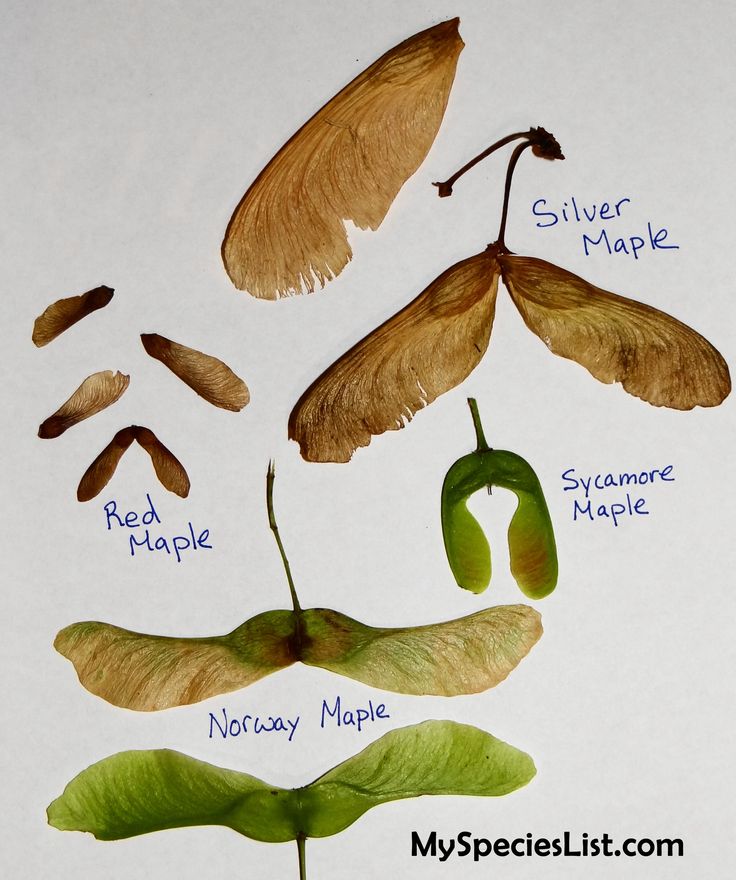
We're basically making our own Pilgrimage in our lives to the Promised Land (a better life free from want or sorrows) just like the Pilgrims who came over on the Mayflower - or should I say Maiaflower as May is named after Maia??
You're probably like "Carna, Beans, and the Caduceus, this is madness!" but as you'll see, it's all intimately intertwined.
What do you know about the Three Sisters of Thanksgiving?
The Three Sisters are corn, beans, and squash planted in intensive companion gardens. The bean vines climb up the corn stalks as a trellis, and the squash and pumpkin plants cover the soil as living green mulch.
Beans are a nitrogen fixer; they fertilize the corn as they grow. The squash leaves choke out weeds, keep the soil cool and moist, and provide a sanctuary for beneficial predators. The gardens are dense and lush, and the plants ripen in continual successive waves.
Of particular importance to Pilgrim and Indian farmers, corn, beans, and squash are highly nutritious. When eaten together, the Three Sisters are a complete and balanced meal, rich in carbohydrates, protein, vitamins, and minerals. And these foods store well for long periods of time.
So the Corn equates to the pole or staff topped by the Pine Cone / Pineal, the Beans are the vine of serpents coiling and rising up that stalk, and the Pumpkin at the bottom is the Root Chakra (in this case its Orange rather than Red but hey - I got close as heck didn't I?
Hahahah!!
As Dolly Parton likes to say, "a Peacock that sits on its Feathers is just another Turkey". I bet you'll never look at Pumkin Pie the same.
Since we're discussing Carna lets look at Cranberries for a moment - they named them that because of their color and because the heads drooped like a Crane, and they sweetened it with Maple sugar. Kinda a neat connect with Canada's national emblem the Maple leaf and with the staples of Maia.
What does the Maple leaf symbolize anyways??
Maple: Love, Longevity, Money. Special for its sugar and syrup it represents success and abundance.
The Maple symbolizes the tree of offering, generosity, balance, promise and practicality.
Everything Fortuna and Hermes of course!!!
Its no coincidence I suppose that a poster on page 2 called my OP writing "syrupy" lol.
The Native Americans have a strong connection to the maple and they often speak of its spirit loving the company of humans. The love works both ways though. Humans love the maple just as fervently.
All maple trees though are associated with the linking and balancing of the male and female. Maple trees balance the yin and yang, the electrical and the magnetic. This tree's spirit and the archetypal energies behind it help the individual to ground psychic and spiritual energies and to find practical means of expressing them within their lives.
It is activating to the chakras in the arches of the fet, which enable the individual to stay tied to the energies of Mother Earth. It was a popular tree for making and using magic wands - especially for sex magic and for awakening the intuition. For men, a staff or wand of maple is often beneficial to work with as it facilitates the awakening and proper expression of the feminine aspects of nurturing, intution, and creativity. For women, the staff or wand of maple helps them stimulate more outward creative expression
Again Stability and Balance. You can make your Caduceus out of it. And of course you put the Maple seed on top because Maple Seeds have Wings!!

Morpheus Mythology

Oneiroi
Oneiri ("Dreams") were various gods and demigods that ruled over dreams, nightmares, and oneiromantic symbols.

Morpheus awakening as Iris draws near by René-Antoine Houasse (1690)
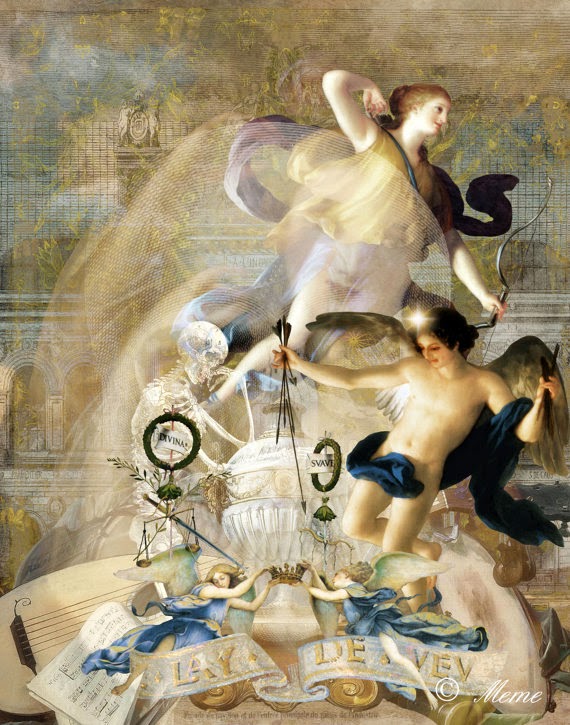
Iris and Morpheus (don't remember where I found it)
IRIS
She's essentially Mercury / Hermes but as a female, serving as Messenger of the Gods and the personification of the Rainbow. She's even associated with the Caduceus among other things...
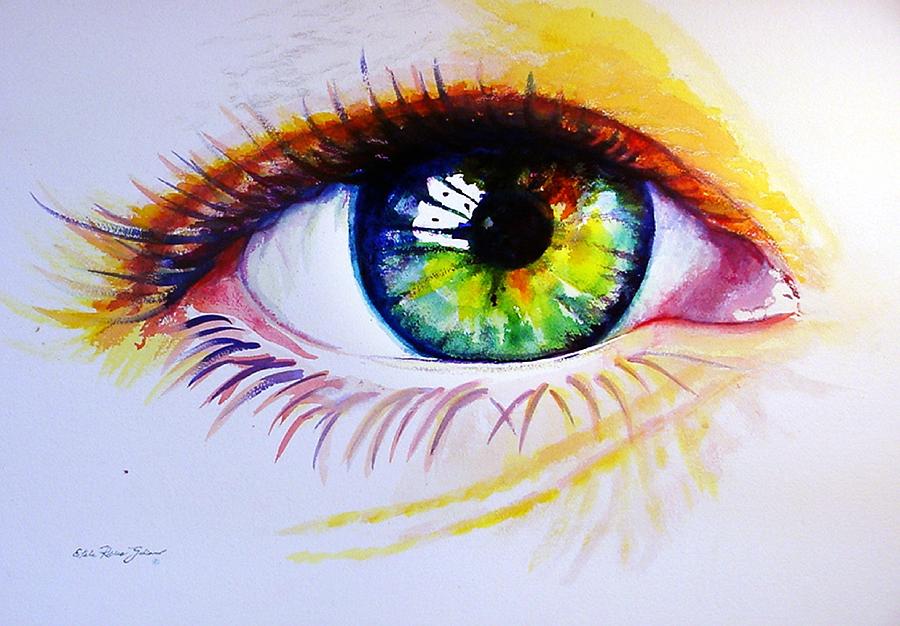

You know it is. His cave is full of Poppies, and Morphine of course is named after Morpheus.
Ovid's famous masterpiece, the Metamorphosis mentions Morpheus and even bears his name.
We as individuals, through knowledge, will experience a Metamorphosis or drastic shift in our appearance and every aspect of our lives as we awaken from the realm of Nightmares into the realm of Dreams much better.

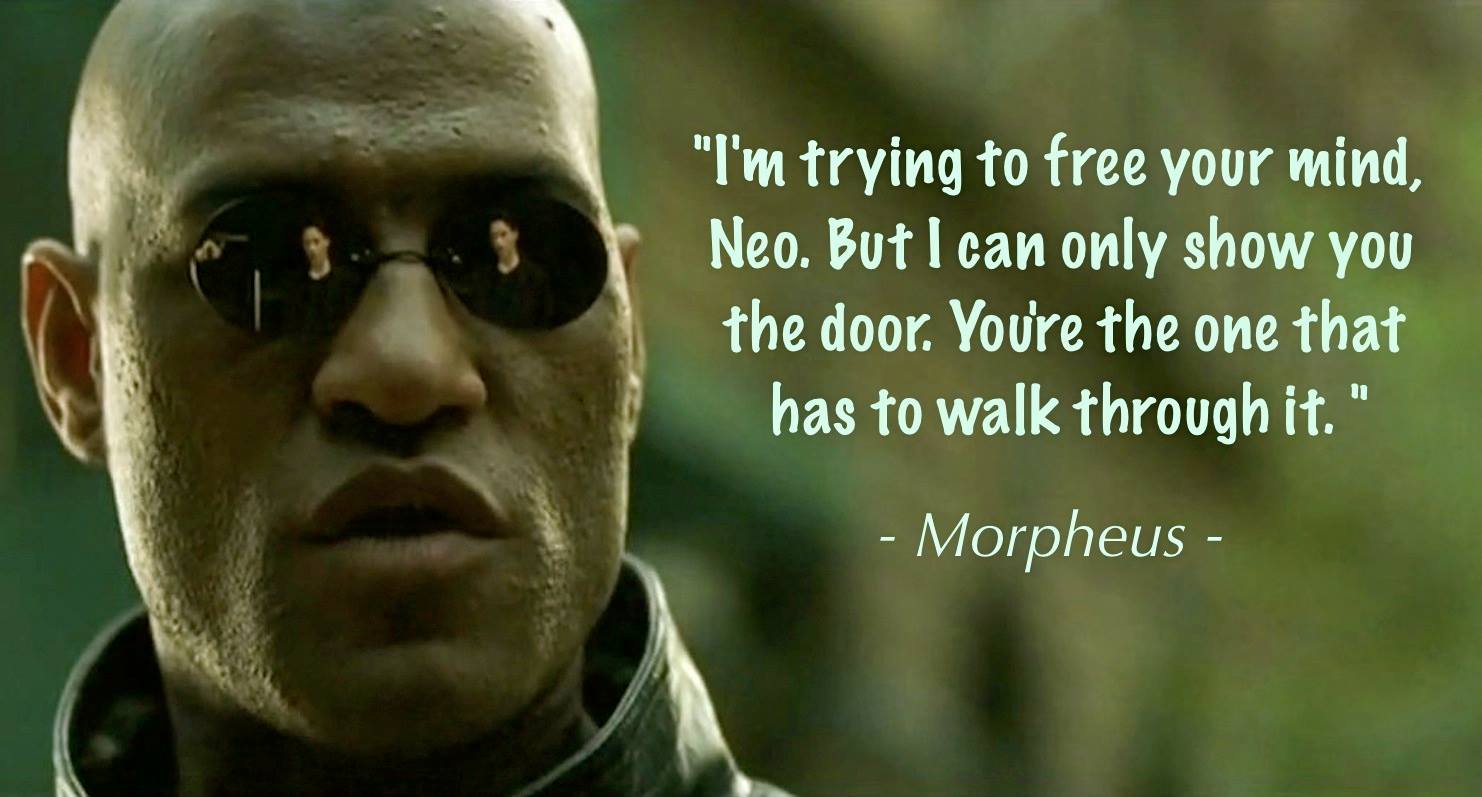
Isn't it amazing how he's depicted either as what we'd call an Angel or, like in this work, Hermes - Mercury?
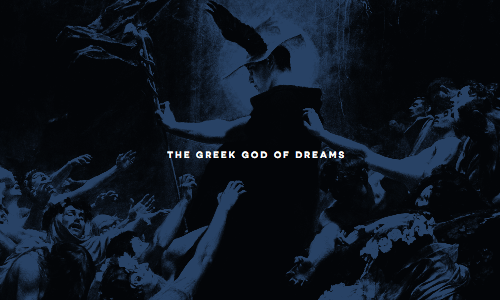
And in this one notice that winged eye over his head...

His pouch contains "Merchandise" - which are Dreams and Messages. He Communicates with us.
He IS Mercury of Merchants.
And Iris is his feminine counterpart symbolically and allegorically.
It's all about Communication from the Divine to you and I. It happens through Light and Insight (Rainbow). All these symbols carry through the entire schemata.

Morpheus has the ability to mimic any human form and appear in dreams. His true semblance is that of a winged daemon, an imagery shared with many of his siblings.
In myth, Morpheus was also said to send dreams through one of two gates, one of ivory, and the other of horn. Starting in the medieval period, the name Morpheus began to stand generally for the god of dreams or of sleep.
Oneiroi
Oneiri ("Dreams") were various gods and demigods that ruled over dreams, nightmares, and oneiromantic symbols.

Morpheus awakening as Iris draws near by René-Antoine Houasse (1690)

Iris and Morpheus (don't remember where I found it)
IRIS
She's essentially Mercury / Hermes but as a female, serving as Messenger of the Gods and the personification of the Rainbow. She's even associated with the Caduceus among other things...


You know it is. His cave is full of Poppies, and Morphine of course is named after Morpheus.
Ovid's famous masterpiece, the Metamorphosis mentions Morpheus and even bears his name.
We as individuals, through knowledge, will experience a Metamorphosis or drastic shift in our appearance and every aspect of our lives as we awaken from the realm of Nightmares into the realm of Dreams much better.


Isn't it amazing how he's depicted either as what we'd call an Angel or, like in this work, Hermes - Mercury?

And in this one notice that winged eye over his head...

His pouch contains "Merchandise" - which are Dreams and Messages. He Communicates with us.
He IS Mercury of Merchants.
And Iris is his feminine counterpart symbolically and allegorically.
It's all about Communication from the Divine to you and I. It happens through Light and Insight (Rainbow). All these symbols carry through the entire schemata.
a reply to: muzzleflash
[Snipped]
Nuff said.
[Snipped]
Nuff said.
edit on 27-6-2017 by whereislogic because: (no reason given)
edit on 6.28.2017 by Kandinsky because: No, no on the
Hitler promo.
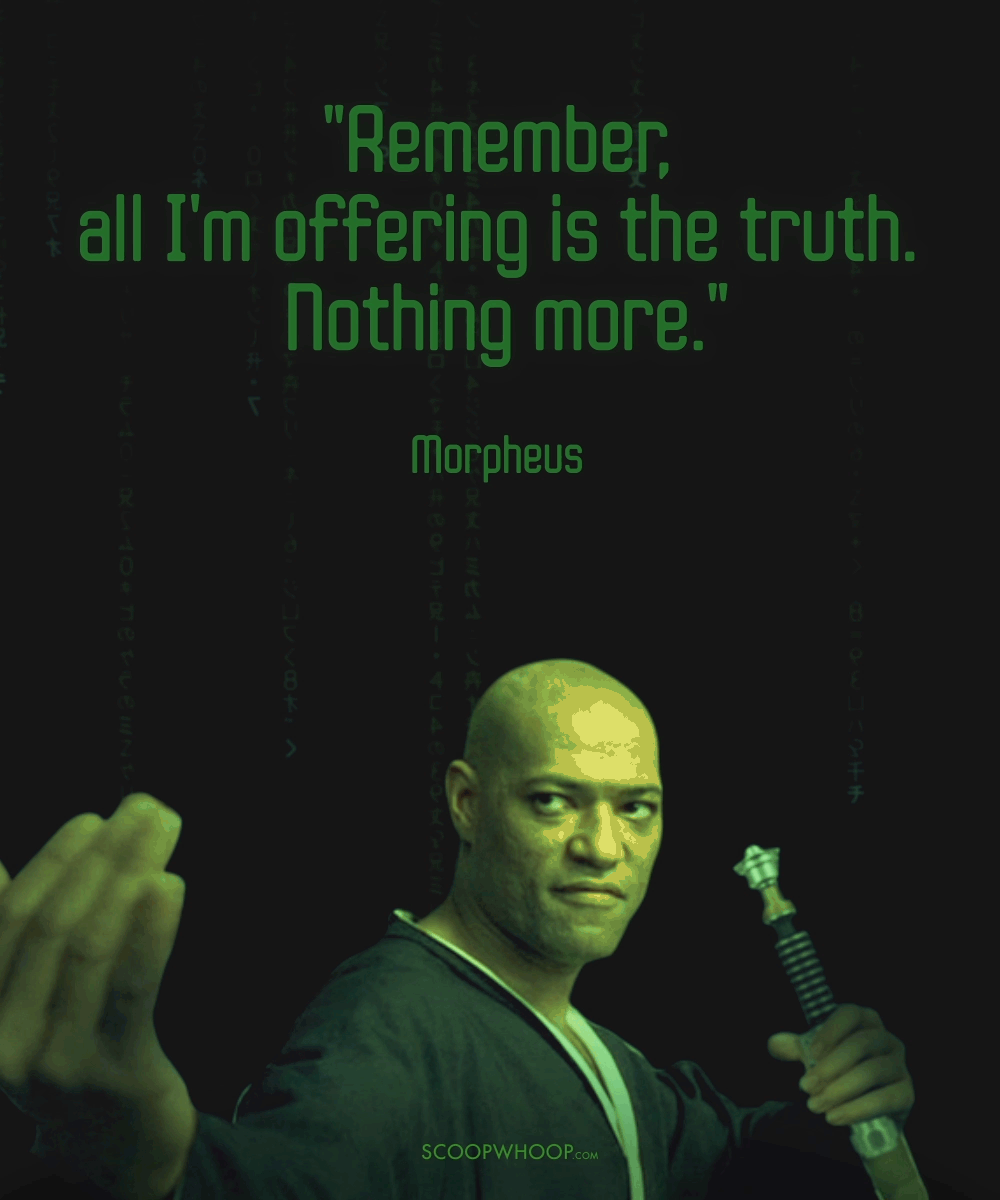

Hold that Phone to the other side Trinity!
Is it just me or am I seeing some major connections here?




Maybe we need to talk about Iris and Peacocks?
Lmfao....
Oh wait, let's talk about one of the other 100 connections I found but haven't got to yet...

Not getting derailed
edit on 6/28/2017 by muzzleflash because: (no reason given)
.........
edit on 6/28/2017 by muzzleflash because: (no reason given)
a reply to: muzzleflash
One of my dreams is that people begin to realize and understand that the heart is treacherous (or desperate):
One of my dreams is that people begin to realize and understand that the heart is treacherous (or desperate):
edit on 28-6-2017 by whereislogic because: (no reason given)
new topics
-
New job to help stop school shootings
Social Issues and Civil Unrest: 2 hours ago -
Covid Jab and the Alien Invasion
ATS Skunk Works: 8 hours ago -
Quantum Computer’s, Plasmoid’s, & UAP’s
Aliens and UFOs: 9 hours ago
top topics
-
School shooting in Madison Wi.
Social Issues and Civil Unrest: 17 hours ago, 10 flags -
Political Warfare & The Resister Special Forces Underground
Political Ideology: 12 hours ago, 8 flags -
Covid Jab and the Alien Invasion
ATS Skunk Works: 8 hours ago, 7 flags -
Trump Cancel trip to New Jersey because of drones
Aliens and UFOs: 12 hours ago, 6 flags -
Quantum Computer’s, Plasmoid’s, & UAP’s
Aliens and UFOs: 9 hours ago, 2 flags -
New job to help stop school shootings
Social Issues and Civil Unrest: 2 hours ago, 2 flags
active topics
-
Defending the need for adherence to Old Testament commandments under the new covenant of Christ
Conspiracies in Religions • 37 • : Radchad -
New job to help stop school shootings
Social Issues and Civil Unrest • 6 • : Naftalin -
Covid Jab and the Alien Invasion
ATS Skunk Works • 11 • : CosmicFocus -
Trump Cancel trip to New Jersey because of drones
Aliens and UFOs • 20 • : 38181 -
So this is what Hamas considers 'freedom fighting' ...
War On Terrorism • 294 • : FlyersFan -
Russias War Against Religion in Ukraine
World War Three • 10 • : Freeborn -
School shooting in Madison Wi.
Social Issues and Civil Unrest • 43 • : PorkChop96 -
Quantum Computer’s, Plasmoid’s, & UAP’s
Aliens and UFOs • 6 • : Dalamax -
Labour Plotting to Postpone May's Council Elections ?
Regional Politics • 5 • : gortex -
Rant. I am sick of people saying the police are revenue raising.
Rant • 15 • : PorkChop96
